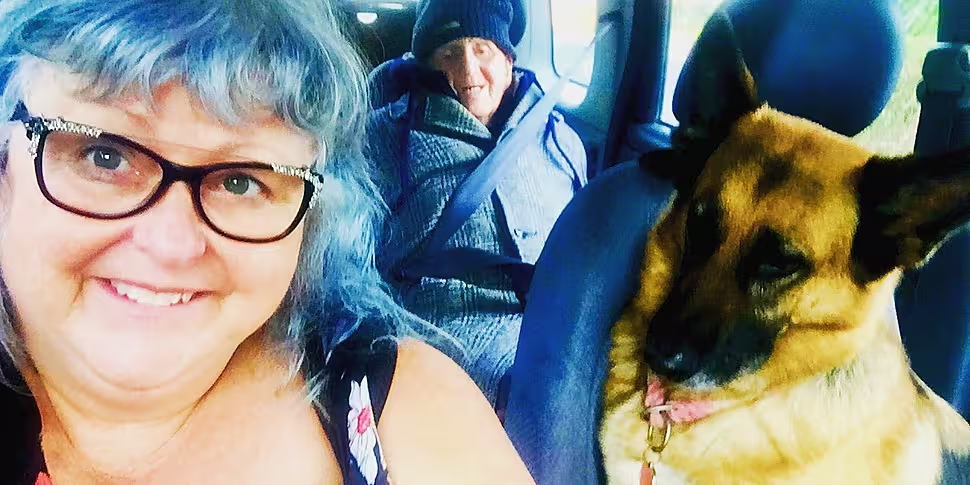Family carers, many of whom are "vital to offsetting the risk of hospitalisation" of the most vulnerable in society, are being "pushed aside" in the rollout of the COVID-19 vaccine.
That's according to Teena Gates, an author, journalist and dementia advocate who cares for her 95-year-old father Terry.
There are around 500,000 family carers in Ireland yet they are not included in the Government's vaccine prioritisation list.
There have been growing calls to address the issue facing home carers during the pandemic and for the Cabinet to recognise carers as a priority group on the list.
Speaking to Newstalk Breakfast with Susan Keogh, Teena explained what is involved in looking after her dad.
She said that she has an alarm on her dad's bed so that she'll know if he is on the move, as well as a camera in the room as he is at a "high falls risk and a danger to himself".
"He has had a dementia diagnosis for the past two years, I absolutely adore him, love having the opportunity to mind him at home," Teena said.
"It's something we've talked about for years that he would like to stay at home as long as he can.
"He loves his relationship with his dog, he loves his relationship with his garden, and I love that I'm able to provide that.
"The downside for me is that I don't sleep at night because dad walks the floors and even going to the toilet, I have to keep the door open, because I literally have to listen for him at any moment of the day.
#Dad(95) back home after getting his first vaccination shot. So far so good. 🙏🏽 pic.twitter.com/vdfX8Wz0Lg
— Teena Gates (@TeenaGates) March 4, 2021
Teena added that her situation "is minor" compared to the experience of some carers, with the group "experts in their field" after being "dropped in at the deep end".
"Literally, there are people keeping people alive and keeping people out of hospital in homes all around the country," she said.
If a carer is unable at any time to look after their loved one, a professional needs to be called in as a neighbour or relative would not be able to tend to the particular needs of the person being cared for, Teena said.
She added that bringing in a professional carer is very expensive, costing her €33 an hour.
Carers have had "no respite" during the pandemic, with many facilities which they could previously have availed of now closed due to COVID-19.
"We have been trying to manage with no assistance or no help," she said.
"There was one night and I paid for a carer to come in, I paid €240 because I was a danger to myself, I hadn't had a full night's sleep in 11 months, but lots of people can't afford that."
Teena believes that carers "are not being heard at all" when it comes to the rollout of the COVID-19 vaccine.
#FamilyCarers are asking for a vaccine because if they get sick - the person they are caring for can no longer remain at home. That cared for person is vulnerable not just to the virus, but also to the loss of their carer. Their health & relationship are interdependent. pic.twitter.com/67u1VP7Mek
— Teena Gates (@TeenaGates) February 17, 2021
She said there has been some "really nasty comments" that carers are trying to "bump themselves up the priority list" or receive the inoculation before other vulnerable groups, which is not the case.
When the priority list was published in December, Teena said she was initially "quite relaxed" that carers weren't explicitly mentioned as she presumed it would be addressed afterwards, but then she learned that "the intention was not to include us".
"In everywhere else but Ireland, they're looking for their carers to get them vaccinated, but here in Ireland, we keep being pushed aside," she stated.
"The Government keeps looking at carers and treating them as a separate individual entity and talking about the risk of the carer not being high, but actually, the fact is we're not talking about our risk, we're talking about the combined risk of us keeping our vulnerable person out of hospital.
"It's a symbiotic relationship and you can't use a tunnel vision approach to talk about family carers as a single entity and not talk about the carer being linked to the care of the person that we are caring for.
"We're aligned with our patient, what affects one, affects the other."
Carers are "vital to offsetting the risk of hospitalisation" of the most vulnerable in society, and should be recognised on the vaccine priority list, Teena added.
"We are the driving force that is keeping people safe in their own homes," she said.









